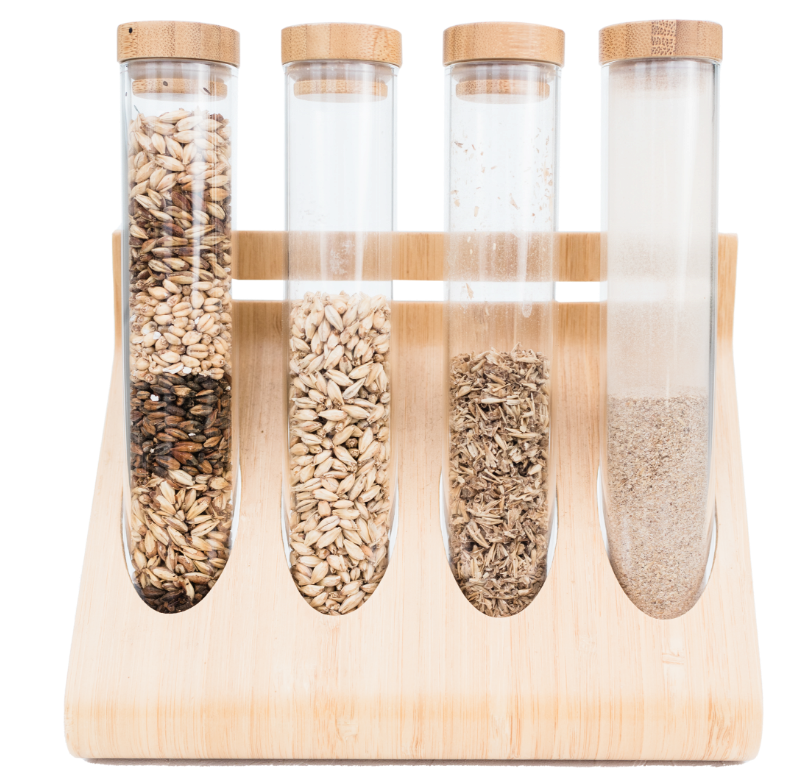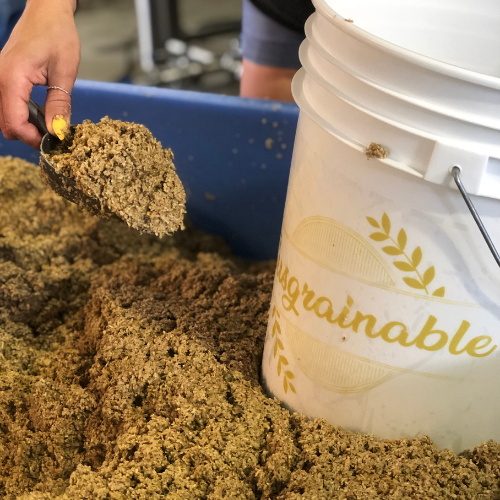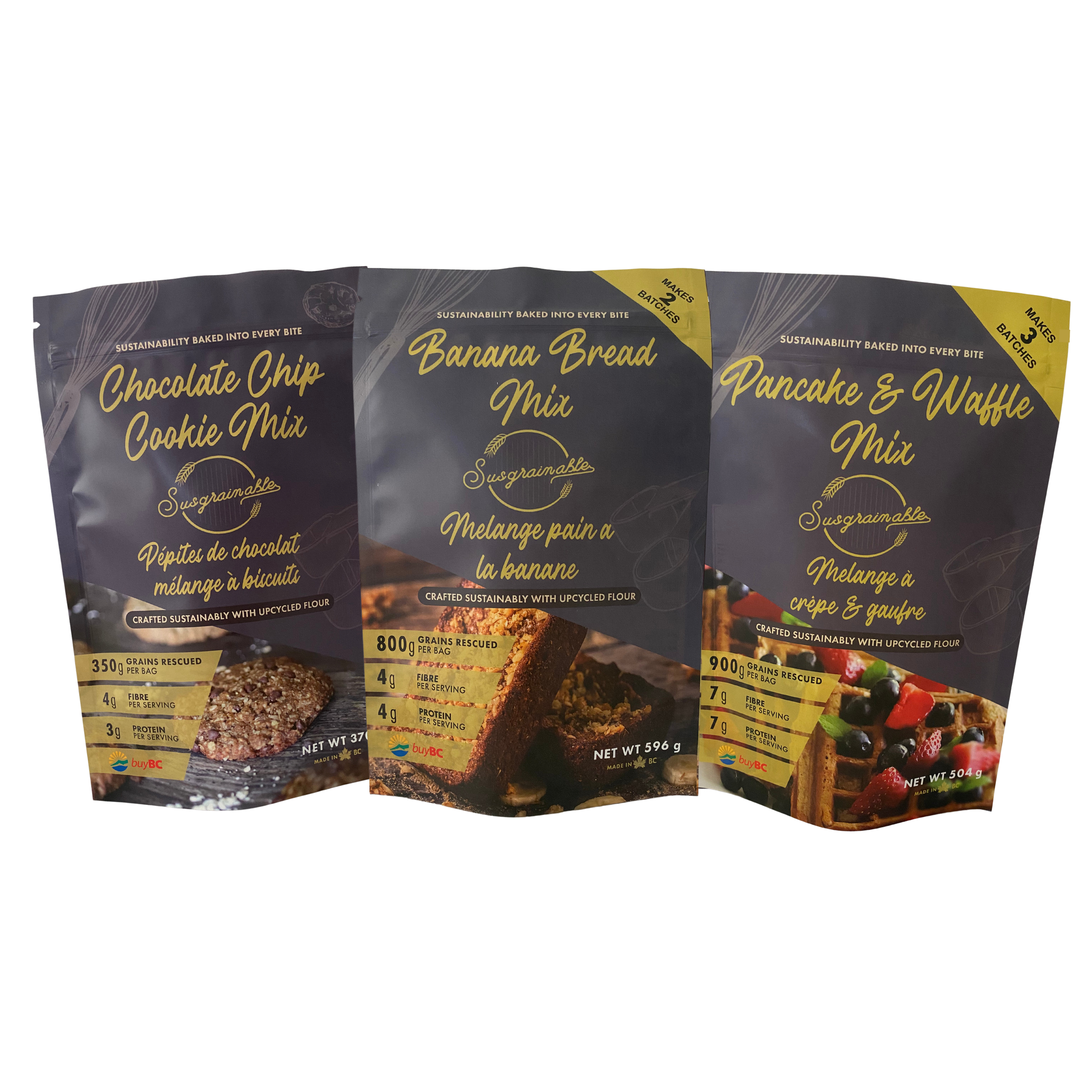FAQ


Frequently Asked Questions
Our Chocolate Chip Cookie mix makes 12 large cookies, but many in our community have mentioned that they can make between 18-24 smaller cookies. We recommend reducing the baking time by 1-2 minutes if you want smaller cookies.
If you follow our recipe on the packaging, our Banana Bread mix makes 2 sizeable loaves, so you'll have enough slices for the whole week! With the Pancake & Waffle mix, you can expect to make around 6 pancakes or waffles in total, depending on how much batter you use for one.
You can find recipes on the back of our packages with each mix providing the instructions and ingredients you need to make your banana bread, cookies, pancakes, or waffles. We post new recipes on our blog and our social media channels. Our community of amazing bakers also consistently shares their unique recipes with our mixes in our Facebook Group. Remember, our mixes are versatile and can be used to bake more goodies than you might think! If you are an avid baker and would like to share your own recipe(s), reach out to us at hello@susgrainable.ca.
No. Barley is a type of grain that naturally contains gluten, a protein that gives baked goods their structure and elasticity. While barley is a low-gluten alternative to other types of flour, it still contains some gluten. Keep checking back in though! We have plans to upcycle different by-products, some of which will be gluten free. To serve those who want gluten free options, we’ll be looking to develop recipes using Upcycled Oat Flour in the near future. Sign up for our newsletter here to be kept in the loop for when that day arrives!
Absolutely, our baking mixes are quite versatile. They work well in most baking applications and deliver a unique, slightly nutty and savoury flavor. Some examples of unconventional recipes we’ve made using our baking mixes and barley flour include dark chocolate barley banana muffins, pumpkin bread, soft ginger cookies, red velvet cake, carrot cake, oyster pancakes, pizza bread, pie crust, sourdough discard pie crust, whiskey balls, crepes, zucchini brownies, and pretzels.
We aim to have orders processed within 24 hours although it can take up to 2 business days to process an order. We typically deliver using Canada Post so you will receive a tracking number once the order is processed. Typically most customers within BC receive their order in 3 days or less, while outside of BC it can sometimes take up to one week.
Our baking mixes are sold in local BC & Alberta retailers, online, at local events, and through sales expositions we attend. Local retailers stocking Susgrainable include Safeway, Stong’s Market, Thrifty Foods, and other local independent retailers and grocery stores. We recommend using our store locator to find a store near you.
If you’re local store isn’t stocking Susgrainable products, feel free to mention Susgrainable to them, whether that’s in person or on social media… it all helps. You can also send us an email with the store's name (and address so we get the right one) and we’ll reach out to them to see if they are interested. Doing both provides us with the best chance to make our products more convenient for you and take an even bigger bite out of food waste.
The recipe you can find on the back of our packaging is different for our plant based versions, with recommended substitutes to eggs and butter being included along with the slightly different recipe instructions for baking. What you find inside the packaging is the same for our plant based Banana Bread mix and our original Banana Bread mix. We don’t sell our green packaging in large retailers, though you may find them in some independent retailers. Special thanks to Earth’s Own Food Company for helping us fund the design of our new packaging through their Plant Project grants!
Spent grains are the byproduct of the brewing process. After brewers extract the sugars they need from barley during brewing, they're left with these spent grains. 99% of spent grains end up in landfills or are used as animal feed, with 1% going to artisanal bakers or upcycled flour production. As spent grains decompose, they pollute local water bodies and produce methane, contributing to global warming and climate change. Instead, by leveraging the principles of circular economy production compared to the linear economy way of producing goods through the take-make-waste model, we take spent grains and turn it into a product of higher value that can be consumed by humans through upcycling, reducing food waste in the process.
Great question and one we did not jump into lightly. We actually spent the first two years of the business package-free to make sure we could learn as much as possible before making the right decision. Our packaging is type 2 plastic and is recyclable where facilities exist. Facilities are currently much more equipped to deal with this type of packaging over others. The problem with most compostable and biodegradable packaging is twofold: the end-of-life systems (think recycling/composting facilities) are not yet equipped to deal with this type of packaging at scale. There are also countless stories about compostable packaging leading to further food waste (product recalls due to shelf-life being shorter than anticipated) and the amount of land that is now being diverted to growing crops for packaging instead of actual food for people. With the amount of food insecurity in the world, we believe this needs to be addressed before we put our products into compostable packaging. Until these problems are solved, we will remain with the packaging that creates the least damage. Having said that, we also partner with zero-waste retailers to make our product available package-free – which is the best option of all. So if you’re ready to make that next step, please visit one of those partners!
Not yet, but it is something we are working on for the future. Going organic is a lengthy certification process and we need to encourage more barley farmers and breweries to switch to organic. As we continue to grow, we plan to further partner with breweries that source organic grains. For now, we work with smaller craft breweries who typically source higher quality grains, some of which have relationships directly with the farmers.
Fairtrade is another certification we will look into. This certification initially was created for industries where workers in developing countries were being severely underpaid and mistreated. Since the barley we use typically comes from the Canadian grain belt in the prairies, this certification may not be one that we pursue. Instead we will most likely go after B Corp certification which is more comprehensive. Our goal is to provide transparency throughout our supply chain once we’re able to launch our own facility within the next 2 years, sharing stories from the farms and breweries we work with. The circular economy only works when we know everyone (including Mother Earth) is treated fairly. That is our goal!
When we collect spent grain from breweries, it’s initially wet. By upcycling it into flour, we reduce the water content, lowering its weight. Rather than listing the amount of flour used in our products, we measure the additional weight of wet spent grain each purchase helps us rescue.
Our baking mixes, which use upcycled barley flour as a primary ingredient, offer numerous nutritional benefits that differentiate them from many conventional baking mixes. Our flour which is the main ingredient in our mixes is high in fibre, plant-based protein, rich in vitamins and minerals, and offers a lower glycemic index compared to many other grains. This helps you bake up goodies that have less sugar than comparable baked goods as all our baking mixes use only organic ingredients, with NO artificial additives or sweeteners such as stevia extract or sucralose. This makes for a clean and simple ingredient profile and nutritional label that you can trust.
Did you know, 95% of Canadians are getting less than 50% of their recommended daily fibre intake! Spent barley grains are rich in dietary fiber, both soluble and insoluble. Reincorporating this fibre into our diets is a big reason why we started Susgrainable in the first place. Fiber is important for digestive health, can help lower cholesterol levels, offer protection from chronic health diseases such as diabetes, and aids in maintaining stable blood sugar levels. It also adds bulk to our diet, making us feel fuller, helping us with weight management. Barley flour contains a significant amount of complete plant-based protein which is essential for building and repairing tissues in our bodies and helps us stay fit as we age or develop our bodies as we grow into becoming adults. Barley is also a good source of essential vitamins and minerals such as magnesium, iron, folate, vitamin B, and potassium. Because barley flour has zero sugar, our baked goods have a 3:1 sugar to fibre ratio, compared to comparable baked goods which have a 15:1 ratio. For reference, Nutritionists recommend a 5:1 sugar to fibre ratio.
Your baking mixes should be stored in a cool, dry place away from direct sunlight. Once opened, ensure the package is sealed properly or transfer the contents to an airtight container to maintain freshness by protecting the mix from moisture. The shelf life our baking mixes is 18 months from when it’s first produced, though always be sure to check the best before date on your package.
Upcycling is a process through which waste materials or by-products are transformed into new materials or products of better quality or with a higher environmental value. It's a way of adding value to what would otherwise be considered waste, reducing the need for new resources and thus decreasing the environmental impact of production. The concept of upcycling is closely tied to the circular economy. A circular economy is an economic system aimed at eliminating waste through the continual use of resources. It differs from a traditional, linear economy, which follows a 'take, make, waste’ model of production. In a circular economy, we keep resources in use for as long as possible, extracting the maximum value from them while they're in use, and then recover and regenerate products and materials at the end of their service life. It's a closed-loop system that reduces waste, promotes resource efficiency, and minimizes the environmental impact of consumption and production.
We get this question a lot! No. There is no beer or alcohol in our products. The first step to making beer is steeping out the sugars from the malted barley grain. This results in 2 products: the first is the sugary liquid that goes on to be fermented creating the alcohol content in beer. The second product, spent grain, is referred to as the by-product in this process and is made up of protein, fibre and minerals. We like to refer to this as beer’s healthier half and think it deserves a much better fate than being a by-product! That is why we rapidly create our shelf stable Upcycled Barley Flour from this by-product so you can take advantage of its nutritional content in your baking. So, no you will not be able to get drunk off any of our products and its safe and healthy for both kids and adults to consume.
Since our cookie mix contains exclusively upcycled barley flour, it can be a little tricky to make on the first go. Here are a few tips you can try.
Use a Kitchen Aid mixer to really work the batter. Doing this will allow the high fibre grains to better absorb the moisture from the butter and egg (or your plant-based substitutes). You can also try beating by hand really vigorously for a longer amount of time if you’re after a good workout before getting to enjoy your cookies!
Add a bit more butter or oil. This will generally help especially if you live in a dryer climate… baking truly is a science!
Our favorite trick (at least it’s Marc’s favorite), especially if you like a softer cookie: add 1-2 tablespoons of your favorite nut or seed butter. This truly is a game changer. It boosts the healthy fat and protein content too!
Most importantly have fun, and know that even if they don’t turn out the prettiest on the first attempt, they will still be delicious and nutritious.

Our Impact
We've rescued
17,500 KG
of grain from 7 local breweries so far!
Our plan is to rescue
20,000 KG
by the end of 2024.

Tasty High Fibre, Low Sugar Baking Mixes
Did we forget to mention their good for you and the planet too!

